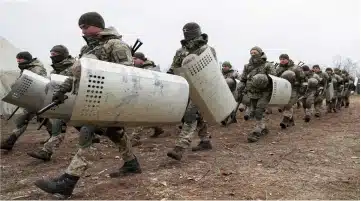By Dr Mukesh Aghi and Colonel Baljinder Singh (retd)
The conflict in Ukraine is well into its fourth month, the Russian ground and aerial and ground assault continues to bombard Ukrainian cities. The ripple effects have been pervasive beyond just Ukraine and European security.
At stake, is a supply chain crisis that has barely recovered since the COVID-19 pandemic. The implications for India are substantial and extend to how Indian leaders should manage the defense and national security enterprise.
After UkraineWar: A World of Change
India, with its large consumer demand has just started to see a COVID recovery with a demand uptick. Russia’s increased aggression on its western neighbour has catastrophically escalated oil prices to an energy crisis and critical shortages in food, grain, fertilizer, and chemicals.
Russia and Ukraine are both significant players in global energy, food grains and the fertilizer markets. Russia is the world’s third largest producer and exporter of oil; the second largest producer and the largest exporter of natural gas; and the third largest exporter of coal. Russia is also the world’s single largest exporter of wheat and the second largest exporter of sunflower oil and largest exporter of fertilizers overall.
Ukraine is also significant to global food markets, as the largest exporter of sunflower oil, the fourth largest exporter of maize and the fifth largest exporter of wheat.
Ukraine also provides about one-half of the world’s supplies of neon gas, – required for high-precision laser equipment used to manufacture microchips. Furthermore, Russia provided a large share of U.S. supplies of palladium, used in semiconductors and catalytic converters. U.S. sanctions on Russia, combined with continued war and deliberate sabotage of critical assets by warring forces, have resulted in immediate and significant disruption to supply chains and the movement of goods from the Black Sea and Sea of Azov to the world.
Impact on India’s Economy and Security
The ripple effects like a tsunami have hit Indian shores. The country’s soaring inflation rate led the Reserve Bank of India (RBI) to increase the repo rate for the first time since the COVID-19 pandemic with the most recent 50-basis point increase earlier in June. The Indian government has raised the prices of fuel, with the RBI estimating a growth forecast of nearly 7% (6.9%,)likely to become lower if global disruptions continue.
India is a net commodity importer and has witnessed an incremental increase in the cost of edible oils, combined with rising costs of importing crude oil. Prices of commodities like sunflower oil, a staple for Indians, have spiralled. The surge in fuel prices has impacted the price of food items, especially perishable items, exacerbated by increased logistic costs. Shipping costs are crushing small and medium enterprises in particular.
In the defence sector, pending equipment purchases and maintenance, repair, and operation of equipment (MRO) are of critical concern. More than 70 percent of the equipment used by the Indian armed forces is of erstwhile Soviet origin and India is heavily dependent on Russia for the supply of spare parts and components to keep the fleet functional. Plans for upgrading 86 Sukhoi fighters for $47 billion had to be shelved due to unavailability of semiconductors and other parts. The Ministry of Defence is also concerned about disruptions in supply of spares from both Ukraine and Russia, particularly for several tanks and missile systems currently being used by the Indian Army and for gas turbine engines used by several Indian Navy warships.
Another major effect is the delay in rolling out the S-400 Air Defence Missile System, which India had procured from Russia. The delivery of the system had begun in December 2021. India needs these weapon systems as it continues to face a military challenge from China along its disputed Line of Actual Control (LAC). The Indian government is concerned about the possibility of Chinese encroachment and the fraught geopolitical situation triggered by the conflict in Ukraine. Hence New Delhi is stepping up its infrastructure and militarization of the disputed areas.
Russia has come under a wave of sanctions, namely ousted from the international banking system, SWIFT, and hence this will affect impending payments for the S-400. The joint project to manufacture AK 203 rifles in India will likely be delayed, despite bureaucratic formalities completed.
First the pandemic and now Putin’s consequentes have halted global recovery. The longer the war, the more pronounced the effects. Though the Indian economy is resilient and recovering, it isn’t immune, and the importance of diversification, including continuing investment in self-reliance through Atma-NirbharBharat and indigenization of the defense industry.
As far as defence is concerned, India must diversify weapon purchases from global suppliers with terms that include technology transfer and domestic manufacturing through joint ventures. India should also work with partners to rapidly indigenize spares and sub-systems for Russian-origin equipment, taking over the MRO of these systems and reducing reliance on Russia which will be a more unreliable source due to its own needs to recapitalize and the complications of global sanctions. Over the next few years, India may be able to provide MRO for Russian-origin systems to nations, such as Vietnam, who also possess large inventories of Russian material.
Prime Minister Modi has made clear that Atma-Nirbhar Bharat does not mean India alone and now is the time to think out of the box about how Indian self-reliance can contribute to global resilience.
Partners like the United States, European Union (EU), Israel, Japan and Australia can coalesce in this effort as long as we structure major defence procurements that attract international investment and simultaneously build India’s defense and technology ecosystem.
(Dr Mukesh Aghi is the CEO & President and Colonel Baljinder Singh is Director Aerospace and Defence at US- India Strategic Partnership Forum. Views expressed are personal and do not reflect the official position or policy of Financial Express Online. Reproducing this content without permission is prohibited).
More information
https://www.financialexpress.com/world-news/the-ukraine-crisis-and-the-supply-chain-conundrum/2579599/

